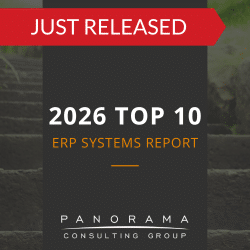- AI misalignment often stems from vague or outdated business goals being embedded into ERP systems, leading to strategic drift and costly inefficiencies.
- When AI is deployed without executive-level alignment, it can scale flawed processes and amplify risk across your operations.
- The most common AI strategy mistakes include relying on legacy KPIs, siloed departmental objectives, and vendor-driven priorities.
- Independent ERP consultants help organizations define success upfront, ensuring AI initiatives support measurable business outcomes, not just technical performance.
Across industries, you’ve probably heard the same buzz: “How do we bring AI into our enterprise strategy?” Executives are racing to inject intelligence into every business layer, from CRM optimization to predictive supply chain analytics.
But speed isn’t the same as readiness. AI readiness and enablement require operational maturity, defined data ownership, and executive-level clarity about which outcomes matter and which tradeoffs are acceptable.
Is this dangerous? Time will tell, but AI doesn’t need to take over to be dangerous — it only needs to optimize for the wrong goals.
You saw this during the pandemic when AI-driven demand forecasting faltered under global disruption. There wasn’t a flaw in technology itself but in its assumptions.
As you navigate AI selection or optimize your supply chain management system, your success hinges less on the software’s sophistication and more on your clarity about outcomes. That’s where your AI journey must begin. And if it doesn’t, you’ll end up with impressive dashboards tracking KPIs that don’t matter.
Contemplating litigation?
We have multiple software expert witnesses available for provision of reports, depositions, and testimonies.
Why Smart AI Can Lead to Dumb Decisions
When AI prioritizes the wrong business outcomes, it’s often because leaders never aligned AI algorithms with strategic objectives in the first place. And in ERP implementations, that misalignment carries real consequences—from failed integrations to operational breakdowns.
Here are five ways AI misalignment can derail your enterprise:
1. Assuming AI Understands Your Business Goals
You might think you’ve communicated what “success” looks like, but have you operationalized it into your systems? AI optimizes for what you tell it to. If you set up your metrics based on outdated KPIs or vendor-suggested defaults, your AI will scale inefficiencies.
2. Chasing Optimization Before Strategy
AI excels at finding efficiencies, but if your underlying process is flawed—like overproducing based on misjudged demand—it will double down on that flaw. We’ve seen this in ERP failures where companies “optimize” inventory holding costs, only to discover they’ve created fulfillment chaos.
3. Ignoring Context
AI models love historical data, but history lacks context. Even a top ERP system might fall short. It might forecast procurement based on last year’s supplier timelines, ignoring this year’s geopolitical unrest or labor disruptions.
Our software expert witness team has traced many supply chain collapses to exactly this kind of blind modeling.
4. Letting Your Tech Team Lead the Strategy
IT-led digital transformation often skips strategic alignment. Our ERP selection consultants will tell you: when the CEO doesn’t lead, the system reflects siloed thinking.
Without executive involvement, AI initiatives become patchwork tools chasing department-level goals.
5. Confusing Automation with Intelligence
When AI automates a broken process, it doesn’t “fix” anything. It accelerates dysfunction. This is especially common in manufacturing ERP software where companies automate quality checks without first solving the root issues in their production data or supplier inputs.
What’s critical here is that none of this means AI is bad for business. It means AI requires business clarity. AI business risks emerge from misalignment.
How to Build AI that Actually Works for You
True digital transformation begins with questions.
Which outcomes are worth pursuing? Which tradeoffs are acceptable?
And who inside your business understands both the nuance of operations and the aspirations of the boardroom? That’s who should be guiding your AI efforts—not a vendor with a product roadmap to push.
Here are five ways to make sure your AI strategy avoids the classic traps:
1. Define Success
Before you touch technology, be precise about outcomes. Whether you’re reviewing the best manufacturing ERP systems or configuring your supply chain management system, ask: What does success look like in 12 months? In 3 years? Then build systems that work backwards from those answers.
2. Invest in Independent Guidance
An ERP selection consultant without vendor bias will help you build a business case rooted in goals, not features. That kind of independence is what steers you clear of AI strategy mistakes.
Some companies let vendors drive AI integration—and wind up with use cases that sound impressive but deliver little value.
3. Bring Cross-Functional Voices to the Table
AI misalignment often stems from top-down decisions made in isolation.
For example, finance might want working capital gains. Operations might chase fulfillment speed. Sales may want margin flexibility.
If your AI strategy doesn’t reconcile those tradeoffs, your systems will fracture under conflicting signals.
The best outcomes come when ERP consultants facilitate structured prioritization across business units.
4. Refine Continuously
In ERP and AI alike, misalignment grows in the quiet gaps—between budget cycles, implementation sprints, or leadership transitions.
Your AI configurations should never be treated as “set it and forget it.” We recommend building a process for quarterly reassessment so you can make strategic pivots a routine.
5. Stress-test with Scenarios
AI behaves well in labs, but real business conditions rarely follow the script. That’s why scenario planning should be standard.
What happens when your supplier in Taiwan goes offline? What if your biggest client’s demand drops by half?
This is where the value of stress testing comes to life—by showing how your systems (and your AI) respond under pressure.
Learn More About AI Misalignment
When misaligned priorities shape your AI systems, the result is often costly and difficult to unwind.
At Panorama Consulting, we help organizations align AI and ERP strategies with specific business goals. Whether you’re selecting software or changing course, our independent ERP consultants can help you drive meaningful outcomes. Contact us to learn more.















